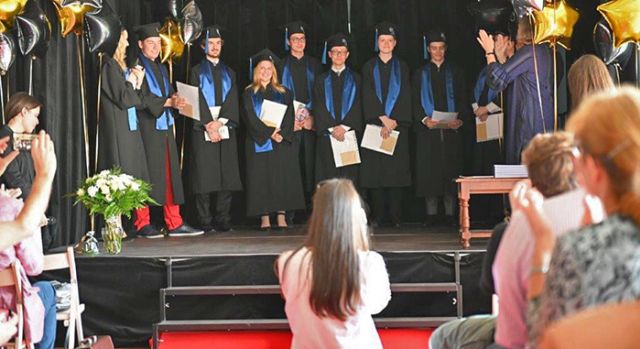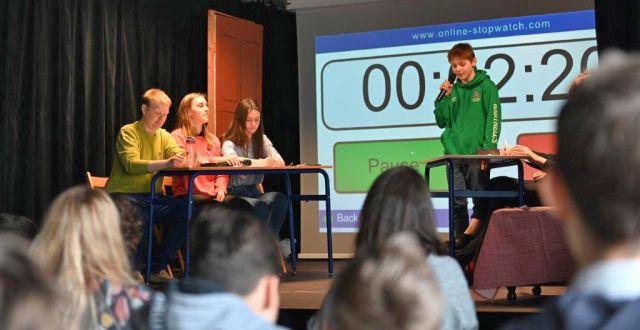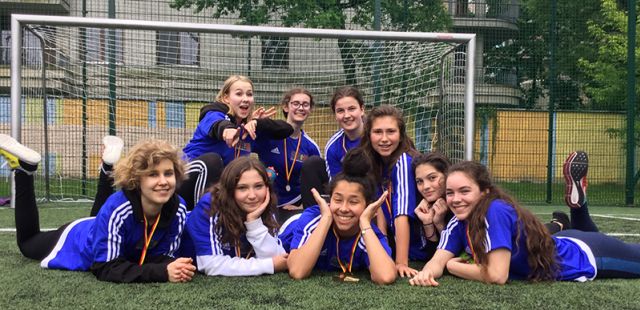On this page:
- School history
- IB programme and the student profile
- IB preschool
- Two curricula: Polish and IB
- Teachers and students
- Bilingual education in other languages
- Recruitment
- Problems
- Achievements

The founder and principal of Monnet International School is Hanna Buśkiewicz-Piskorska, an educator with great passion.
School history
Our Kids: It was already 27 years ago that you founded your school. That was at the time when private education in Poland was just beginning. How did this happen?
Hanna Buśkiewicz-Piskorska: Education is my hobby. I used to teach Polish in elementary school, and there were many things there that I did not like. After the transformation in Poland, when non-public schools began to appear, together with my friends and family members who worked at universities, we decided to set up our own school. I wanted children not to waste their time at school, to have a school that would work effectively, so that there was no need for parents to pay for extra support for their kids after school. And a very important issue for me was that I wanted a school with a human face which cared about human relationships, including between faculty, students, teachers, and parents.
Our Kids: I know you are the first school which offered a full cycle of IB education from preschool until the end of high school. Since when has this full three-stage cycle been available? I imagine this must have been done in stages.
Hanna Buśkiewicz-Piskorska: Our high school is the oldest. In 2003, we got IBO authorization. They made some recommendations to improve our space. At that time, we rented a very small building in the city, which was only 315 square meters. I started looking for a larger place, but I did keep that small one and organized a preschool there.
Then we created our middle school, and got IB authorization for our MYP programme. But we still didn’t have an elementary school. We began collaborating with a local private elementary school and were planning to create a partnership, but our visions became slightly different. Our preschool children’s parents insisted we create our own elementary school, which we did in 2012. Those Grade 1 students now reached Grade 7, so next year the full cycle will be completed.
We will have achieved IB program continuity. Next year in June, we will have IBO officials coming to visit our school to do a comprehensive evaluation. This is actually my own initiative—usually IBO people visit each of the programmes separately, but I wanted them to evaluate us as a whole. I really want suggestions on what else we can do to improve, so that we achieve full cohesiveness between our programmes.
IB programme and the student profile
Our Kids: Are all IB schools the same since they’re authorized by the same institution?
Hanna Buśkiewicz-Piskorska: In Poland, the most popular program is the high school program with the IB diploma. Schools introduce it to improve their education quality and to better prepare young people for post-secondary studies. This program has an academic focus, whereas I’m not only interested in that, but also in the full IB philosophy, whose aim is to create and develop particular personality features in students. This means creating and shaping the full person, not just educating.
This is why IBO created something called the IB student profile. It’s a set of 10 qualities, and the goal of IB programmes is to develop them. The profile influences the methods of teaching. One such quality is risk-taking, which is not popular in traditional teaching. An IB student needs to be an independent thinker-inquirer, open-minded, caring, so they need to have characteristics which are not at all important in traditional schools.
To create and develop these qualities, we need to come up with appropriate teaching methods. We use a lot of experiments, which are not treated as forms of knowledge given to the students, but as ways of acquiring this knowledge. The same applies to non-science subjects. For example, in teaching history, we don’t provide students with materials they need to memorize. Instead, we concentrate on them studying source materials from which they formulate hypotheses and verify them.The curriculum also includes the theory of knowledge, creativity, development of the physical side (fitness, health), as well as community activism—volunteer service benefiting other people and the environment.
Our Kids: Does this mean that some children are particularly suited for this kind of education, or is it the case that any child is potentially able to succeed in an IB programme?
Hanna Buśkiewicz-Piskorska: I think that any young child who comes to an IB program at the preschool level, and is intellectually fit, if properly guided, will be able to successfully earn the IB diploma. There may be problems if a student comes from a traditional program.
Even if they have the best marks and are used to hard work, they can encounter difficulties in an IB programme, because here they’re asked to do independent research for which they’re completely unprepared. So they can start feeling frustrated or even depressed, because so far they've only been asked to learn what was given to them by the teacher and in the textbook, to make notes and pass tests. Here, however, they’re expected to formulate their own independent research hypotheses, plan experiments which will either confirm them or not, or to independently interpret literary text without any help. This may be challenging for a student who’s afraid of making mistakes because they were always punished for that.

IB preschool
Our Kids: How different is an IB preschool from the regular preschool?
Hanna Buśkiewicz-Piskorska: Very different. Even at this stage, students’ work is based on multidisciplinary projects. When a new project begins, the teacher must come up with a way of initiating it: she either gathers some objects or starts asking questions, so that the children themselves begin to search for answers. The teacher is a facilitator of activities, which are supposed to lead the children through play to a level of knowledge which is really very high. The learning must not be imposed, but rather be the result of a natural sequence of inquiry. From the intellectual point of view, those children develop incredibly.
Another very important element is a lot of group work. Children learn the effect of group work is more powerful than the individual capabilities of each group member—therefore, they learn that individuals complement each other. In this way, the children learn natural respect for others: okay, I may be better at counting, but my friend is better at presenting it beautifully, for example, visually, so I also benefit from this.
Even from the very beginning of preschool, children do a lot of presentations. For example, after they come back from a family trip, they want to talk about it. Of course, at the beginning, such presentations are very simple, but through this method children are no longer afraid of public speaking. Another interesting format in IB is the so-called three-way conference. At the end of the project, the children invite their loved ones, and they can use resources such as the teacher and the school room to show what was the most enjoyable part of the presentation, where they had problems, and how they dealt with the problems. Children gather a portfolio which they can go through themselves to analyze what progress they made and how they developed.
So the child is an author of their own educational process and learns to get satisfaction and joy from their own progress. What blocks progress in traditional education the most is the fear of being worse and constant comparison, whereas here the most important thing is for the children to understand that everybody’s good at something. My two grandchildren attend our preschool, and if nothing else, that made it worthwhile to create this school.
Two curricula: Polish and IB
Our Kids: How do you manage to implement simultaneously two curricula—the Polish national curriculum and IB?
Hanna Buśkiewicz-Piskorska: PYP programs do not have specific subject content set by IB. IB specifies only the teaching methods. Schools must implement the national curriculum, but they do it through the IB methodology. The double curriculum was in my view the way to “internationalize” the students. The students use Polish textbooks plus another set of textbooks, usually British, which the teachers choose as the most useful in the IB program. IBO doesn’t have its own textbooks—it does offer exercise sets for various subjects and methodology guidelines, and it specifies learning outcomes at each level for particular subjects, such as math.
Our Kids: What about the international high school diploma?
Hanna Buśkiewicz-Piskorska: That’s different. The last two years of high school are called the IB Diploma Programme, and they have their own curricula, as well as their own textbooks. In fact, part of the diploma exams are essentially “passed” throughout those two years, because 30% of the final result is earned by students on the work they do for those two years.
For instance, oral exams are recorded or filmed, and although they’re evaluated by the teacher, they’re also sent for moderation to IBO. If the students work systematically throughout the two years at the time of their final exam they will have already earned 30% of the mark. Such a system promotes students who are engaged and have worked actively all the time. The IB final exam is completely different from those that young people take in schools implementing the Polish National Curriculum, but based on the decision made by the Polish Minister of Education in 1992, it’s treated the same as the Polish National Curriculum final exam (matura).

Teachers and students
Our Kids: Who are your teachers?
Hanna Buśkiewicz-Piskorska: Most of our teachers are Poles, usually with PhDs, or PhD candidates from Warsaw universities, as well as teachers who have been teaching IB diploma courses for a long time. They are specially prepared to teach this program, and every two or three years they’re sent to attend workshops organized by IBO, paid for by our school. IBO makes some modifications in particular subjects, and thus the teachers must be trained to stay up to date. It’s like a never-ending process.
Our Kids: And what about your students?
Hanna Buśkiewicz-Piskorska: The higher the educational level, the more foreign students we have, as well as children from families who come back to Poland from other countries and who speak little or no Polish. These are children from mixed marriages or foreigners. In our preschool, we also have such children. I think probably the fewest of them are in our elementary school, but next school year I think we will have a little more.
Our Kids: How large are your classes?
Hanna Buśkiewicz-Piskorska: In elementary school, the maximum number is 18 and in high school 25.

Bilingual education in other languages
Our Kids: How do you manage to implement bilingual education? Is every class taught by two different teachers?
Hanna Buśkiewicz-Piskorska: That’s what happens in preschool. One teacher speaks exclusively in Polish and the other one exclusively in English. In elementary school, there is a teacher who teaches in both languages, whereas in the diploma programme the teachers are Poles fluent in English. At this stage, the teaching is done exclusively in English.
Our Kids: Your school organizes language exchanges with other countries.
Hanna Buśkiewicz-Piskorska: We have had an exchange for our French-language and Spanish-language groups since 2008, and we also have a language exchange with Taiwan.
Our Kids: I did read about your Chinese-language program.
Hanna Buśkiewicz-Piskorska: Yes, we have two teachers who are Chinese.
Recruitment
Our Kids: When do the parents need to start seriously considering visiting your school and getting to know it a lot better? Do you have entrance exams?
Hanna Buśkiewicz-Piskorska: Those students who start at our early stages receive recommendations from the teachers and when they do, they are exempt from an entrance exam. If a student does not have such a recommendation, e.g., comes from outside, they need to take an entrance exam. This year is unique because of the double cohort. We started interviews in February, our open day was in March, and our entrance exams started at the beginning of April. I conduct interviews myself, because I want to get to know every student. This time, we had about 200 candidates for about 75 spots.
Problems
Our Kids: Does it happen in your school that someone is not coping with the program?
Hanna Buśkiewicz-Piskorska: Yes, this happens of course. It also happens in public schools I know because I have a very close contact with someone at the Mikolaj Kopernik high school in Warsaw, the first public high school to offer the IB diploma. They encounter the same kinds of problems.
Our Kids: What do you do in such cases? Do you have any support that you offer to students or do students simply drop out?
Hanna Buśkiewicz-Piskorska: In our school, this does not lead to dropouts— students get every possible necessary help.
Our Kids: Thus it looks like those students most likely to achieve are those who started early in the IB programme, perhaps at the preschool level?
Hanna Buśkiewicz-Piskorska: Yes, indeed. This is why IBO created the cycle.
Achievements
Our Kids: What are you most proud of? What’s special in your school?
Hanna Buśkiewicz-Piskorska: I’m very happy to see and observe the change that takes place in students. For example, a young, shy kid comes, and then I see how he or she plays the main role in a play, or is very active in the school council. I’m very proud of the school council—I meet with them every two weeks. Thus, I place special emphasis on activities that speed up the children’s development. I don’t think that the only thing that matters is academic achievement, such as good results on exams.

In my view, school needs to enable a student to participate in a school play, be its director, or take part in other activities as a member of the school community. This enables students to feel better and achieve academically. This is why we put a lot of emphasis on extracurricular activities. For us, this is an integral part of the educational process. Our students themselves point out that this has a great and direct influence on how they function in class and how they learn.
People who read this also viewed:
- Warsaw private schools
- Kraków private schools
- Poznań private schools
- Wrocław private schools
- Łódź private schools
- Rzeszów private schools
- Gdańsk & Gdynia private schools
-
Advice Guide
- ABC of educational terminology: Glossary of terms and concepts
- The admissions process
- Advantages and disadvantages of studying in an international school
- The application process
- Benefits of Polish private schools
- Bilingual schools
- Boarding schools
- Choosing a private or nonpublic school in Poland
- Compare schools in Poland
- English schools in Warsaw
- Homeschooling
- International schools in Kraków
- International schools
- Private school interviews
- Music education
- Myths about private education
- Non-public schools in Poland
- School open houses
- Our Kids Interview: Get to know EF Academy Oxford
- Our Kids Interview: Get to know Open School
- Our Kids interview: Get to know Regent College International Schools
- Our Kids Interview: Get to know The American School of Warsaw
- Our Kids Interview: Get to know The British School Warsaw
- Our Kids Interview: Get to know Wrocław Cosmopolitan School (two interviews, new video)
- Poland school profiles
- Private day schools
- Gifted schools & programs
- Private Jewish schools in Poland
- Language schools
- Private school tuition and costs in Poland
- Private schools in Poland
- Private schools in Poland offering French-language immersion
- English immersion schools
- Poland school uniforms
- Private special needs schools in Warsaw
- Public versus non-public schools in Poland
- Private school questions
- Private school rankings
- Reasons for choosing private schools - Our Kids’s survey report
- Religious schools
- Schools and classes for children with ADHD in Poland
- Social primary schools
- Social Schools
- Special educational needs (SPE) certificates
- Special needs schools
- Study abroad at a private school
- The first annual non-public school fair in Poland
- The first annual Our Kids non-public school expo in Warsaw was a great success
- Third Private School Expo in Warsaw - summary
- Types of schools
- Types of schools in Warsaw
- Warsaw preschool costs
- Why private school?
- Why parents go private
-
Grades
- Boarding high schools
- Choosing a high school in Poland
- Mokotow High School Campus - a new Warsaw high school and Thames British School campus
- Montessori nursery schools
- Montessori preschools
- Our Kids Interview: Get to know English Montessori School Katowice
- Our Kids Interview: Get to know FSA School
- Our Kids Interview: Get to know KIDS & Co.
- Our Kids Interview: Get to know Polish British Academy of Warsaw
- Our Kids Interview: Get to know The English Playhouse and The English Primary
- Poland education: grade levels
- Preschools in Warsaw
- Private & non-public preschools
- Private & non-public primary schools
- Private bilingual elementary schools in Warsaw
- Private high schools
- Private high schools in Warsaw
- Private middle schools
- Nursery schools
- Private primary schools in Warsaw
- Social high schools
-
Locations
- Boarding schools in Warsaw
- English schools in Kraków
- International Baccalaureate (IB) schools in Warsaw
- International schools in Warsaw
- Montessori schools in Warsaw
- Non-public schools in Warsaw
- Our Kids Interview: Get to know EF Academy
- Our Kids interview: Get to know Excellence in Education better
- Our Kids Interview: Get to know PRIMUS Non-Public Primary School No. 47 and Non-Public Secondary School
- Our Kids Interview: Get to know the Canadian School of Warsaw
- Our Kids Interview: Get to know The Primary and Secondary Schools of the Sisters of Nazareth in Warsaw
- Private Catholic and Christian schools in Warsaw
- Private day schools in Warsaw
- Private language schools in Warsaw
- Private schools in Bialystok
- Bydgoszcz schools
- Częstochowa schools
- Private schools in Gdańsk & Gdynia
- Katowice schools
- Private schools in Krakow
- Lublin schools
- Olsztyn schools
- Private schools in Poznań
- Private schools in Rzeszów
- Szczecin schools
- Private schools Warsaw
- Private schools in Wrocław
- Zielona Góra schools
- Private schools in Łódź






 POL
POL CAN
CAN